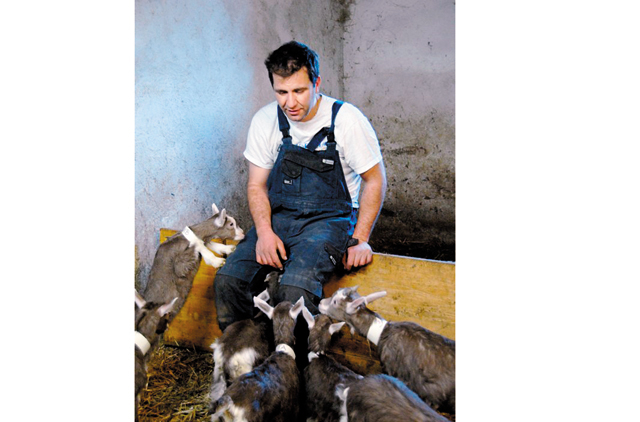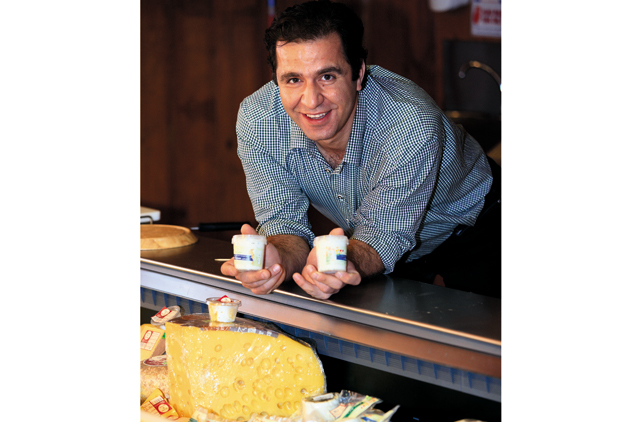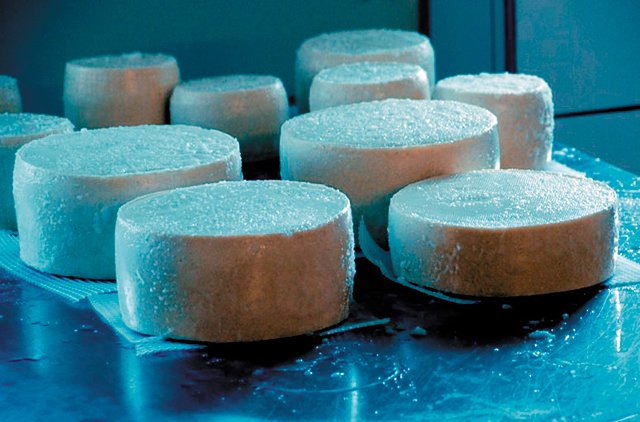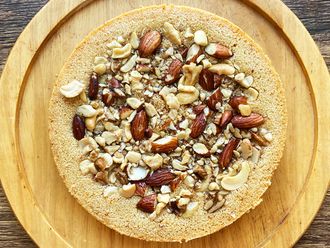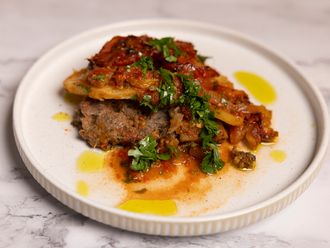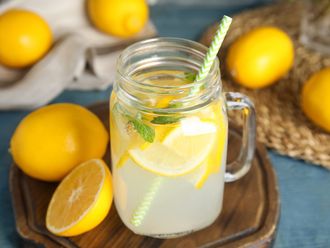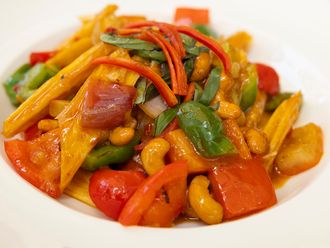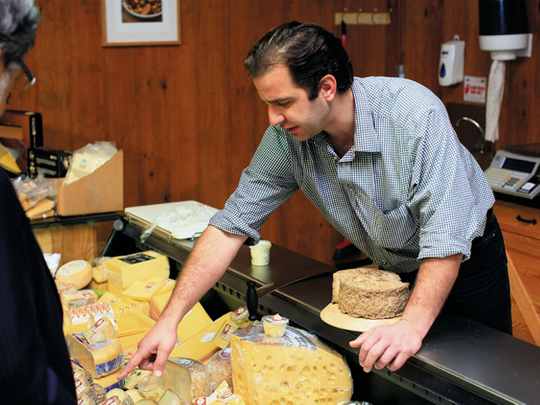
It is a labour of love for Thomas and Brigitte Eberharter, whose passion for the mountain life and making organic cheese has led them to ignore the urban siren call and head to fresh air and green grass. Their's is a way of life that has been the livelihood of thousands of people with more oxygen than gasoline in their systems.
The Eberharters had no idea how things would turn out when they decided to pack up their lives and move to Tyrol, Austria, with the hope of producing the region's finest organic goat's cheese. But they knew they wanted to try.
Soon - and with small hiccups that didn't hurt too much - they adapted to the rustic lifestyle. Today they are known as farmers. Their cheese is revered and available in a range wide enough to fill the largest of cheese platters. And they love their herd of 60 goats so much that each one has a name. Do they remember every single name? You can bet your last cheese crumb they do.
As Austrian valleys go, Alpbactal is breathtakingly lush. The grass, like wet green paint, is home to handsome and adaptable Toggenburger goats. Add to this the singing breezes, the dizzyingly blue skies, the lyrical meander of the Alpbactal river and you have yourself a picture postcard akin to an art form.
Just visualising the pristine Austrian landscape in Tyrol is sure to make you smile in a way that would satisfy the most demanding of portrait photographers. And, at an altitude of 1,000m, you'll find the Eberharter's 500-year-old farmhouse Haidacher Zeigenhof, which faces the east, soaking in the sun.
From engineering to farming
Thomas Eberharter, a petroleum engineer by education and profession, was on a visit to Dubai recently to introduce his delectable range of cheese at the Organic Foods and Cafe.
Born in Nuremberg, Germany, Thomas was a smart average Joe who fell in love with Brigitte, a computer programmer. Life was good, urbanity had its edges, rough and smooth. But in the end its charms failed and they made a decision that was irrevocable. They'd chuck it all up and go for greener pastures.
"People thought I was a little crazy, as agriculture is not exactly the best way to make money. In the last seven generations there has not been a single farmer in my family. Yet one day I decided enough was enough. I had to break free from the 9 to 5. So I saved enough money to study agriculture. Both my wife and I wanted to live closer to nature and earn a livelihood that did not disturb its balance too much. Once I got my degree in agriculture there was no looking back."
Of course, when you realise you love agriculture, it could mean you want to do anything from growing apples to digging tubers from sweet-smelling soil. For Thomas, his idea of farming was goat husbandry, cheese and meat-making. Brigitte had no problem with that.
"Contrary to the general perception, goats are very intelligent animals," says Thomas.
Obviously, he is making a point here to those who think bleating is a dismissable voluble expression. "The Toggenburger goats we breed are affectionate and intelligent. They also make good pets. We have a genuine interest and love for our dairy goats." If you doubt this then he invites you to visit his farm to see how this bond between man and goat can be so affirming.
Preserving history
But we are getting ahead of the story a bit. Remember the hiccups mentioned earlier in the story? Well they were due to the couple's intensive hunt for a suitable farm and farmhouse.
"People, especially in the Tyrol region, are very proud of their farms. They do not make much profit, and yet they take so much pride in their land and animals that they'd never agree to sell it off to someone else, especially a complete stranger from a non-farming background."
And then they spotted the dilapidated old farm. In Austria, every farm has a special name and, no matter what, the name stays on. The Haidacher Zeigenhof came with a 500-year-old history and it charmed their gumboots off.
It was love at first sight. It was a vision that they'd only imagined in their dreams. An 800 hectare piece of land, it had a long history, and that made it even more precious. On Christmas Eve in 1924 the farmhouse burnt down, and much of the farm was damaged. The next owner restored and rebuilt it, but the farm's business subsequently fell on bad days. Then, despite the vagaries of time, weather, storm and rain, the Haidacher Zeigenhof stood its ground. Here was a farm that refused to crumble and be relegated to the history books.
In 2004, the Eberharters bought it, and they have since made the farm's recent past the strongest slice of its history. The Haidacher Zeigenhof is today recognised by Bio Austria, an organic certification body, as a leading organic farm.
By 2005, Eberharter's cheeses were rolling off the shelves, racing to the market to stand proud next to their counterparts, which are cheeses that have been produced by the same families for generations.
What's so special?
Though Haidacher Zeigenhof makes a variety of goat's cheeses in soft, semi-hard and hard ranges, Eberharter feels that the unique thing about his cheeses is that they are made from raw goat's milk.
Is cheese made from raw milk particularly special? Apparently, yes. Firstly, he explains, milk is normally boiled to 58˚C for pasteurisation. At his farmhouse, milk is heated only to 38˚C and is considered raw.
After the goat is milked, the milk is left to naturally form goat yoghurt. Then, at 18˚C, rennet from a kid goat, called Lieb, is introduced to naturally curdle the milk. After it completely curdles, the whey is separated from the curd and the curd is hand-crumbled and rubbed to dissolve the granules so it turns into soft cheese. It is then hung, and holes are made in the strung-up bags to let in air, thus making the cheese semi-hard or hard, depending on what the final aim is for the cheese.
The cheese is then left to be cured. The process of curing cheese involves ripening it by holding it in a carefully controlled environment to allow microorganisms to develop and thus accentuate its flavours. All these processes help in maturing the cheese and in developing its sharp, unique and strong flavours.
"We want our products to be as natural and unprocessed as possible, so we don't standardise or homogenise our milk." The Eberharters also don't use sugar, colouring preservatives, stabilisers or powdered milk in their cheese.
Raw milk cheese is considered to be the best in the world because it exhibits flavours that truly reflect the unique and natural qualities of the milk it contains. You can taste the breed, the grass that the animal ate, if it comes from the mountains, hills or valleys, you can taste the expertise of the cheesemaker, and all this is a true pleasure. Its difference is its real strength," says the city slicker-turned avid farmer with obvious pride.
"When skilfully made, allowed to ripen and mature at its own pace, it develops flavours and textures of such complexity and length and it retains the inherent qualities of the milk used in its making. It expresses diversity (through seasonal and local characteristics) and the art of its maker like no other food." If you can't detect poetry in his explanation, then you need to eat more cheese.
A perfectionist to the core, Eberharter feels you can't make good cheese until you've formally learnt the art of cheesemaking. "The only way to check you're making the right cheese is by tasting the cheese while it is being made. Every little thing matters when this wonder food is in the process of creating itself. From the kind of grass the goat eats, to the general hygiene the animal enjoys, and the temperature variables the cheese is subjected to, everything has to be controlled.
"We make sure the grass is fresh, we cut the grass three times a year and change the pasture sites every 2 to 3 weeks. If the hygiene in the storing or preservation is poor, the cheese turns brown and you have to just throw it all away. The temperature and humidity in the cellars where it is left for ageing has to be controlled to get the perfect flavour. In fact, so delicate is the difference that arises in temperature variables that one cannot produce the same flavour in the same variety of cheese twice."
His face is alight as he ticks off all the boxes and it is hard to believe he was at one time living in a city, soaking up the neon. In fact, he feels a true sense of gratitude for life having steered him in a direction that has given him immense peace of mind.
"There is a difference between having a job to live and enjoying a job. I decided to change my life, and I have found a way to enjoy it."
The health benefits of Goat's milk
Among the health-conscious, the argument in favour of goat's milk doing the rounds now is that it is easier to digest, contains more amino acids, has a higher level of calcium and vitamin A and B12 and is a great substitute for those who suffer from Lactose Intolerance (LI).
"Goat's raw milk has been found to have a number of health benefits that are greatly reduced during pasteurisation. These components include immune-strengthening antibodies and protection against asthma and allergies," says Thomas Eberharter.
"Goat's milk has smaller fat particles, which makes it easier to digest. Goat's milk is often referred to as naturally homogenised since hardly any cream rises to the top with it. Most people allergic to cow milk products or who are lactose intolerant can consume goat's milk products. The lactose or protein in the milk is what usually causes the allergic reaction or intolerance. Goat's milk has both lactose and protein, but it is of a different composition that doesn't create the side effects that cow's milk does. Goat's milk is often recommended for babies because of its easy digestibility and non-allergenic properties.
Goat's milk's natural buffering qualities make it beneficial for babies or people with ulcers or other stomach problems. Our famous "Naschbergkäse", as well as the "Toggorino" cheese that is left for nearly a year to mature in the stone cellar, are both very therapeutic."
Thomas' Cheeses:
- Alp-Traum: Is a cream cheese made from goat's milk. It has natural fat content. It also contains bacteria cultures, rennet and sea salt.
- Haidacher (green): This is a soft cheese made from goat's milk. It also contains bacteria cultures, rennet, sea salt, rosemary, thyme, savoury basil, paprika, garlic and meliot.
- Toggorino: A hard cheese made from raw goat's milk with a natural fat content. It is ripened for at least 6 months in a natural rock cellar. It also contains bacteria cultures, rennet and sea salt.
All these varieties of cheese are currently available at the Organic Foods and Cafe outlets in Dubai Mall and the Greens. Very soon their Goat Butter and Yoghurt will also be available at both these outlets .



